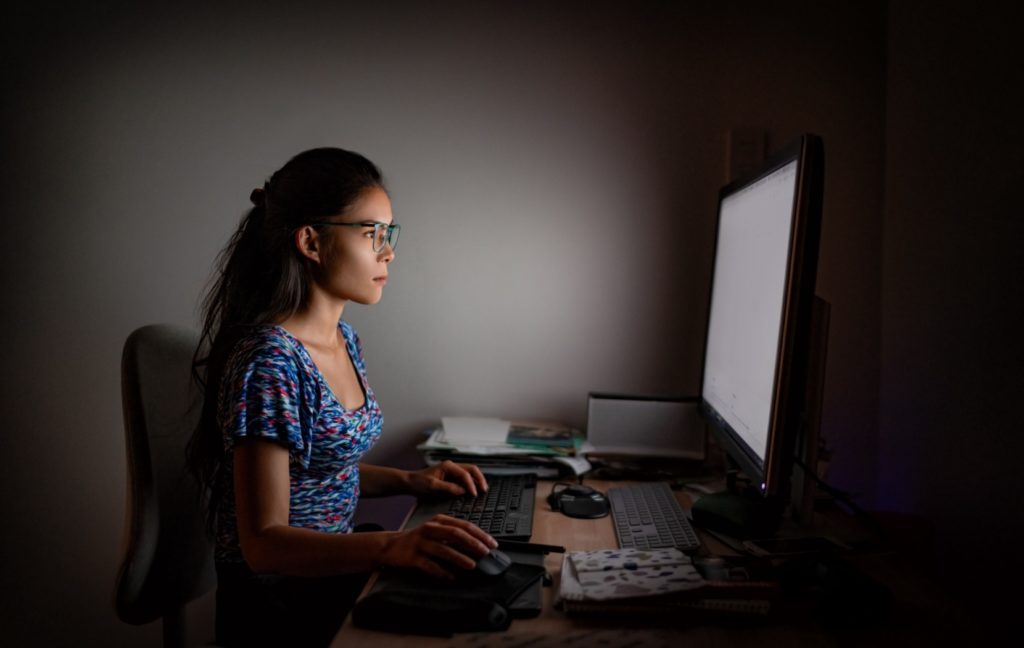In an age dominated by screens, from our computers to smartphones and tablets, blue light glasses have emerged as a trendy solution to combat digital eye strain. With claims of improved sleep and reduced eye fatigue, it’s no surprise that blue light glasses are gaining popularity among digital device users.
But are these glasses just as useful as regular eyeglasses, or are they simply a stylish accessory? There is presently a lack of quality evidence supporting the idea that blue light helps with eye strain. However, blue light glasses may help with the disruption of sleep patterns caused by exposure to blue light before bed.
What Does Blue Light Do to Our Eyes?
Before we can assess the effectiveness of blue light glasses, it’s essential to understand what blue light does to our eyes. Blue light is a high-energy visible (HEV) light with a short wavelength. It naturally occurs in sunlight, but is also emitted by digital screens and artificial lighting.
Most of us spend several hours a day staring at screens, whether for work, school, or leisure. This prolonged exposure can lead to digital eye strain and sleep disruptions.
Research indicates that blue light penetrates deep into the eye, potentially contributing to retinal damage over time. While the long-term effects are still being studied, experts believe that limiting exposure could help maintain eye health and physical health.
How Do Blue Light Glasses Work?
Blue light glasses are designed with special lenses to filter out or block blue light. These lenses often have a slight yellow tint, which neutralizes the blue wavelengths emitted by screens. By reducing exposure to blue light, the glasses aim to alleviate eye strain and promote better sleep.
Studies on the efficacy of blue light glasses show limited results in how useful blue light glasses are. On average, studies show that blue light glasses are not effective at reducing digital eye strain. However, studies investigating the link between blue light and sleep show that blue light glasses may help improve sleep.
How Blue Light Glasses Might Improve Sleep
Blue light, emitted by electronic devices like smartphones and computers, can significantly disrupt sleep patterns. This is because blue light suppresses the production of melatonin, a hormone that regulates the sleep-wake cycle.
Melatonin levels naturally increase in the evening, signalling to the body that it’s time to wind down. However, exposure to blue light can delay this process, making it harder to fall asleep and leading to fragmented sleep.
Blue light glasses are designed to filter out blue light wavelengths so they can’t reach the eyes. By reducing blue light exposure, these glasses can help improve sleep quality by promoting melatonin production and regulating the body’s natural sleep-wake rhythm.
The Role of Lifestyle Changes for Sleep
While blue light glasses might be a helpful tool, they shouldn’t be relied upon as the sole solution to sleep disturbances. Implementing lifestyle changes can have a more significant impact on your overall well-being. The best way to minimize blue light exposure to your eyes is to reduce screen time when possible. At the very least, you should put down the screens 1-2 hours before going to sleep.
Prioritizing regular exercise, maintaining a balanced diet, and managing stress are essential components of a healthy lifestyle. These factors contribute to better sleep making them valuable additions to your routine.
Alternatives to Blue Light Glasses
If you don’t buy into the hype around blue light glasses, there are alternative methods to reduce blue light exposure. One simple option is to adjust the settings on your devices to lower the amount of blue light emitted.
Many smartphones, tablets, and computers now come with built-in blue light filters, often referred to as “night mode” or “dark mode.” These settings reduce the blue light intensity, making it easier on your eyes during prolonged use.
Even if blue light glasses won’t fix your digital eye strain, adopting healthy screen habits can go a long way in minimizing digital eye strain. Practicing the 20-20-20 rule (taking a 20-second break every 20 minutes to look at something 20 feet away) and ensuring proper lighting in your workspace are effective strategies.
Making an Informed Decision
When considering whether blue light glasses are worth it, several factors come into play. It’s essential to assess your individual needs, screen time habits, and any existing eye health concerns.
If you frequently struggle with sleep issues, blue light glasses might be a valuable addition to your routine. However, they aren’t a silver bullet, and they won’t fix your digital eye strain.
By exploring the various aspects of blue light exposure and considering expert opinions, you can make an informed decision about whether these glasses align with your goals and lifestyle.
Are Blue Light Glasses Right for You?
In today’s digital world, protecting our eyes from potential harm is a priority for many. Blue light glasses offer a convenient solution, promising relief from eye strain. However, current studies don’t back up that claim. If you do decide to try blue light glasses for sleep, they should be used as part of a holistic approach to eye health.
The best way to start your eye health journey and manage your digital eye strain is to consult an optometrist about your symptoms. At Village Optical, we offer eye exams for the whole family. Book an appointment with us today!



